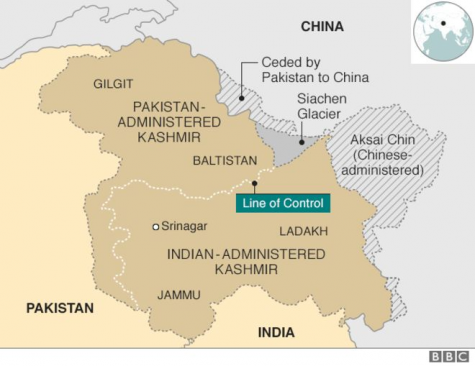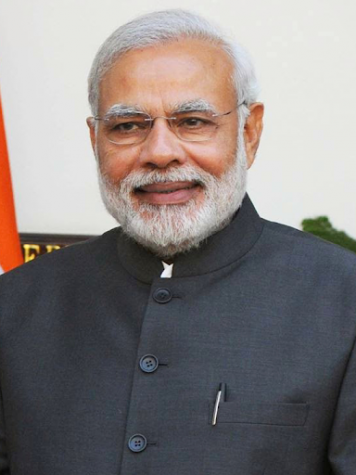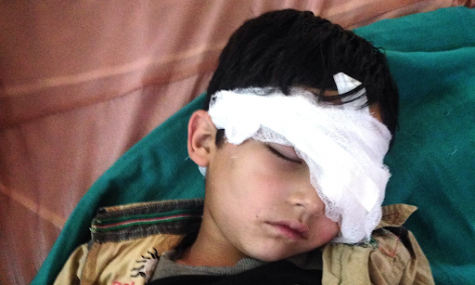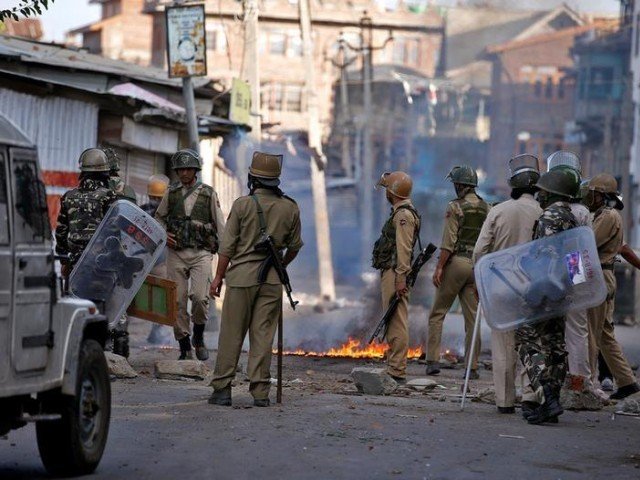Kashmir. Not Your Sweater.
The seriousness of the unspoken conflict between India and Pakistan.
Indian soldiers in Indian Occupied Kashmir, where the day to day conflict is taking place.
Everyone in the student body is somewhat up to date on vaping, stress, domestic politics, or essentially what the most common headlines are that we see day to day. However, in the digital age, there are so many headlines that it is impossible to read them all. Despite their lack of coverage, most of these headlines hold major significance and usually impact billions across the globe. Perhaps the most intense issue is that of the ever-lasting Pakistan and India dispute over Kashmir.
Kashmir is claimed by both nations in its full capacity, yet is administered only in part by both. Pakistan-administered Kashmir is known as Azad Kashmir, or “liberated” Kashmir, whereas India’s side is referred to as Indian Occupied Kashmir (IoK) or Jammu and Kashmir. The region has seen three wars fought over it and with its history, the current escalation of tensions is worrisome.
Both nations possess nuclear weapons, but Pakistan holds an advantage in the air with its JF-17 fighter, which shot down two Indian fighter jets earlier this year. India, however, maintains the upper hand at sea with a coastline a little over three times larger than Pakistan’s and active military personnel, leaving it with one of the greatest and most advanced navies on the face of the Earth. This extends to the Indian land advantage, having more tanks and artillery than its neighbor.

So who exactly wins in a war between these two countries? The answer is quite simple. No one. It is approximated that nearly 125 million people would be wiped off the face of the planet if Pakistan and India were to engage in a nuclear war, and the effects would last long enough to affect many generations to come, putting mankind on course for extinction. This is another reason why it is crucial that all countries must be involved in the issue and what makes it a multilateral crisis. Since the crisis would become global, every nation’s security is at risk from a nuclear fallout that could last for decades and cause collapses in industries like agriculture.
The global scrutiny India is under lately is because of its revoke of Article 370, which granted IoK an extent of autonomy and did not allow any non-Kashmiris to purchase land there. India had already violated multiple ceasefire agreements and humanitarian law with its occupation of the region. The communications blackout and curfew it has currently placed IoK under furthers the current fascist identity of the Bharatiya Janata Party (BJP), a Hindu nationalist party in India to which the current Prime Minister, Narendra Modi, belongs to.
India has received global condemnation from China, Pakistan, Turkey, the United States, Germany, and Iran on its actions, as well as the UN Secretary-General and the UN President calling for an immediate end to the curfew. The curfew has led to IoK politicians detained, thousands of boys and girls imprisoned, pellet guns being used on children, and the raping of women and girls in the area.
In one case, Indian soldiers raided two villages and raped 30 women and girls. This is worsened by objectifying comments from politicians saying Indian men should marry Kashmiri women because they are “white-skinned”. accompanied by intense propaganda by the BJP, where journalists receive “300-400 threatening messages a day” if they say anything against Modi.
India’s other major party, the Congress Party, has called out Modi and the BJP for their actions which have led to increased hatred towards marginalized communities through propaganda saying they do not belong (such as Muslims) in India and ultimately led to division within the nation. Separatist groups such as Khalistanis, Hyderabadis, and Sikhs have shown strong opposition to the Indian government and the BJP and have further pushed the motivation of separatist movements within the country.
However, it is difficult to judge who is innocent in Indian politics because 40% of the BJP candidates have a criminal case against them, 39% in Congress, and 233 of the 543 members named as winning seats facing criminal proceedings, some as serious as rape, murder, torture, and terrorism.
PM Modi himself is not innocent either. In 2002, Modi watched on as 1000 Muslims were killed in riots in Gujarat, the state he governed, and failed to stop the massacre; this caused him to be banned from entering the United States in 2005. He has also been condemned for many other human rights violations in his nation and has made his intentions clear for how he views India’s makeup by labeling 1.9 million of its residents as stateless”, also stating that the true intention of this action was to displace Muslims in the Bengal province of India.

Furthermore, Mr. Modi’s allegiance to Rashtriya Swayamsevak Sangh (RSS), a right-wing Indian organization that has claimed its inspiration to be the Nazi party and its ethnic cleansing of Jews, is even more alarming. What the world must ask is, how can someone whose trigger finger is always itching and a government corrupted with criminals who have morbid intentions execute decisions on IoK morally?
Even if we were to attempt to convince ourselves of New Delhi’s false narrative that they are looking to promote peace in the region, this is negated by their own refusal to come to the table for diplomatic talks. The issue has been taken to the UN and President Trump has offered to mediate in the talks. India claims the issue to be unilateral but chalks it up as bilateral in the UN. Whenever Pakistan has pushed for bilateral peace talks, India states that it only wants to discuss Azad Kashmir, what it can do to gain Pakistan-administered Kashmir, and that IoK is not up for discussion.
It has ruled out any chances of multilateral peace talks and even requested the denial of a UN publication that blasted the Indian occupation. It stated that “The Report once again recognizes human rights violations in Indian occupied Jammu and Kashmir (IoK). It documents in detail the excessive use of force by the Indian occupation forces”. The report continued by stating, “The only solution to the Jammu and Kashmir dispute is to grant the people of Indian occupied Jammu and Kashmir (IoK) the legitimate Right to self-determination as recognized by the numerous United Nations Security Council Resolutions, which is essential for the security and stability of South Asia and beyond”.
Last year, when I visited Azad Kashmir, we went to a shop that was run by a refugee who fled from IoK. He described the gruesome injustice of the Indian military presence there and the resentment Kashmiris feel toward Indian occupation, despite what New Delhi may say. Many conditions described by those who have escaped match the analysis of the UN report. The population of 8 million have long protested Indian occupation and voiced their support for an independent nation or joining with Pakistan. Azad Kashmir has become a safe haven for the few that have escaped from IoK.
One of the most frightening issues is the rebellious attitude of the Kashmiris who have been cut off from the world in IoK. Pakistani Prime Minister Imran Khan stated in his address to the UN, “What’s he going to do when he [Modi] lifts the curfew? Does he think the people of Kashmir are quietly going to accept the status quo? What is going to happen when the curfew is lifted will be a bloodbath. They will be out in the streets. And what will the soldiers do? They will shoot them. … Kashmiris will be further radicalized.” Radicalization will pose a major threat to India, and Modi’s awful past precedent for handling situations of genocide will only worsen the matter and prove problematic for the people of IoK.

Ultimately, the impact of this is concerning. The people in Jammu being as oppressed as they are have essentially lost their fear of death and fight to any degree necessary for their freedom. Because of this, India’s attempt to lock down the region has been responded to with an increase in terrorist and radical activity.
The cruelty of the BJP has been exposed on the world stage especially after the conclusion of the latest United Nations General Assembly. The fascism and dangerous Hindu nationalism stirred by the party has long been hidden by Modi and his government, with many blind to the situation because of the Western media’s refusal to report on anything not related to Trump. Modi has long attempted to shield the world from his actions and from the true face of the current Indian government, with an obsession of ethnic cleansing and a state built strictly for Hindus. This is an issue that can be resolved if both parties attempt to have a sensible dialogue so that peace may prevail in the region. This also allows other pressing issues such as poverty, which plagues the subcontinent, to be resolved together.
Pakistan must also hold up its end of the bargain. A nation that has often allowed terrorists to carry out attacks on India must do its utmost best to prevent such attacks from happening in the future to ensure regional tranquility. Any straightforward leader would pounce at the chance to pull their country out of poverty, have strong bilateral nations with their neighbors, and ultimately become a beacon for peace. PM Modi, however, is in no way a straightforward man and should not be dealt with as such.
The smile on his face and the knife ready in his back pocket proves just that.
Zayaan Tirmizi is a sophomore at NAI. For as long as he can remember, he has had passionate interests in learning about global politics and foreign policy,...




Marissa Granite • Mar 17, 2020 at 2:43 pm
Such good writing every time, Zay. Keep showing the unshown.